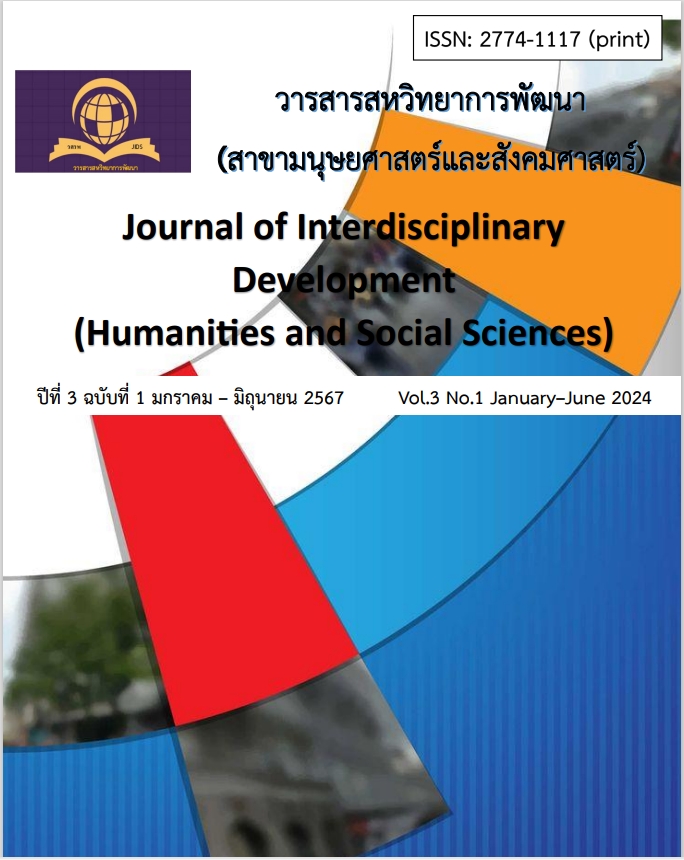Situational Leadership Model of Phrapariyattidhamma School Administrators General Education Department Group 8
Keywords:
situational leadership model, Phrapariyattidhamma SchoolAbstract
Situational leadership model of Phrapariyattidhamma School administrators General Education Department, Group 8, which conducted this research study, has the objectives: 1) Study the leadership situation according to the situation of administrators of Phrapariyattham School, General Education Department, Group 8 2) to create a leadership model according to the situation of the administrators of Phrapariyattidhamma School, General Education Department, Group 8 and 3) to evaluate the leadership style according to the situation of the administrators of Phrapariyattidhamma School, General Education Department, Group 8 Sample group used in the research study Consisting of administrators and teachers who perform regular teaching duties in Phrapariyattham School. General Education Department, Group 8, in the 2014 academic year, there were 38 schools, 38 administrators. and 131 teachers / people included in the sample There were a total of 169 images/people used in the research and 9 experts used in the first group discussion, 20 people in the second time. Statistics used in data analysis were quantitative data, including percentage (Percentage), mean (Mean) and standard deviation (Standard Deviation), while qualitative data were used. Method of content analysis (Content Analysis) from recommendations of experts and experts. Using the summary method. The results of the study found that 1) The level of leadership according to the situation of the administrators of Phrapariyattidhamma School, General Education Department, Group 8, overall is at a high level. When considering each aspect, it was found that it was at a high level in every aspect. The areas with the highest averages are: The next aspect of participatory leadership is the aspect of leadership that builds relationships. And the side with the least average value is the leadership style selling ideas/coaching. 2) Situational leadership style of administrators of Phrapariyattidhamma School, GeneralEducation Department, Group 8, consisting of the relationship of 2 variables: Leadership according to the behavior of the administrators of the Phrapariyattidhamma School, General Education Division, Group 8 and Situational Leadership of the administrators of the Phrapariyattidhamma School, General Education Division, Group 8. 3) Results of feasibility assessment and the appropriateness of the leadership style according to the situation of the administrators of Phrapariyattidhamma School, General Education Department, Group 8, found that The evaluators had opinions on the situational leadership style of the administrators of Phrapariyattham School, General Education Department, Group 8, overall at the highest level. When considering each aspect, it was found that Every aspect is at the highest level.
References
กัลยาณี พรมทอง. (2546). ความสัมพันธ์ระหว่างความฉลาดทางอารมณ์กับภาวะผู้นำการเปลี่ยนแปลงของผู้บริหารในวิทยาลัยพลศึกษา. (ปริญญานิพนธ์การศึกษามหาบัณฑิต.สาขาวิชาการบริหารการศึกษา. มหาวิทยาลัยศรีนครินทรวิโรฒ).
จิตรา ทรัพย์โฉม. (2556). ความสัมพันธ์ระหว่างภาวะผู้นำการเปลี่ยนแปลงของผู้บริหารโรงเรียนกับประสิทธิผลการบริหารโรงเรียนสังกัดสำนักงานเขตพื้นที่การศึกษาประถมสกลนครเขต 2. (วิทยานิพนธ์คุรุศาสตรมหาบัณฑิต. สาขาวิชาการบริหารการศึกษา. มหาวิทยาลัยราชภัฏสกลนคร).
ธันตกร ไชยมงคล. (2556). ความสัมพันธ์ระหว่างภาวะผู้นำการเปลี่ยนแปลงกับความพึงพอใจในการปฏิบัติงานของครู กลุ่มโรงเรียนบางละมุง 1 สังกัดสำนักงาน
เขตพื้นที่การศึกษาประถมศึกษาชลบุรี เขต 3. (วิทยานิพนธ์การศึกษามหาบัณฑิต.สาขาวิชาการบริหารการศึกษา. มหาวิทยาลัยบรูพา).
นรินทร์สุดา พันธฤทธิ์. (2557). ความสัมพันธ์ระหว่างภาวะผู้นำการเปลี่ยนแปลงของผู้บริหารสถานศึกษากับความผูกพันต่อองค์การของครูโรงเรียนมัธยมศึกษาในเขตจังหวัดสระแก้ว สังกัดสำนักงานเขตพื้นที่การศึกษามัธยมศึกษา เขต 7. (วิทยานิพนธ์การศึกษามหาบัณฑิต. สาขาวิชาการบริหารการศึกษา. มหาวิทยาลัยบรูพา).
สำนักงานคณะกรรมการศึกษาขั้นพื้นฐานและสถาบันพัฒนาครู คณาจารย์ และบุคลากรทางการศึกษา. (2550). เอกสารประกอบการพัฒนาหลักสูตรพัฒนาผู้นำการเปลี่ยนแปลง เพื่อรองรับการกระจายอำนาจสำหรับผู้บริหารการศึกษาและผู้บริหารสถานศึกษา. กรุงเทพฯ : สำนักพิมพ์คณะรัฐมนตรีและราชกิจอานุเบกษา.
สุวรรณา คำมา. (2556). ความสัมพันธ์ระหว่างภาวะผู้นำการเปลี่ยนแปลงของผู้บริหารโรงเรียนกับความพึงพอใจในการปฏิบัติงานของครูผู้สอนในโรงเรียนมัธยมศึกษา. (วิทยานิพนธ์คุรุศาสตรมหาบัณฑิต. สาขาวิชาการบริหารการศึกษา. สถาบันราชภัฏเลย).
อรุณ รักธรรม (2532) .หลักมนุษยสัมพันธ์กับการบริหาร. (พิมพ์ครั้งที่ 2). กรุงเทพฯ: ไทยวัฒนาพานิช.
Bass, B. M. & Avolio, B. J. (1990). Manual for the multifactor leadership questionnaire. Polo Alto, California: Consulting Psychologists Press.
Hoppock, R. (1935). Job Satisfaction. New York : Harper.





